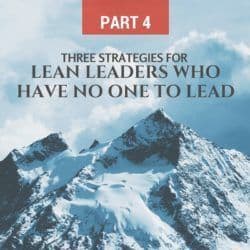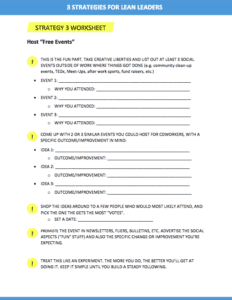M ark's note: Here's the last of three change strategies in a series by a guest blogger, Paul Serafino. You can click here to read earlier posts in this series about leaders who have no one to formally lead. Next week, I'll publish Paul's concluding thoughts and the whole series will be available as a free PDF eBook, as well.
ark's note: Here's the last of three change strategies in a series by a guest blogger, Paul Serafino. You can click here to read earlier posts in this series about leaders who have no one to formally lead. Next week, I'll publish Paul's concluding thoughts and the whole series will be available as a free PDF eBook, as well.
By Paul Serafino:
This is the 3rd and final strategy of this series, and by far the most fun. Earlier, I recommended following each of the 3 strategies in consecutive order, giving at least a week in between to get started. I provided an attached worksheet with the two previous posts, as well as with this one. Those are intended to help organize your thoughts and take the first few steps.
To execute Strategy 3 well, you'll rely extensively on your own interests and interpersonal skills, which is great because it allows you to put a personal spin on it. If you're a social media buff and like virtual networking, use that. If you play sports and love the friendly competition of your work league, use that.
The whole point is to be creative, and the possibilities endless.
Strategy 3: Host “free events”
Be creative and stage an event like a free networking meet up, or an art exhibit with food. The goal is to attract the people who enjoy socializing with a purpose. Odds are, those people will be open to trying different things, or at least learning something new.
The Point: Manufacturing companies all have the same basic set of elements – materials, machines, processes, and products. The work gets done by the people. The “work” includes creative thinking, idea generation, problem solving, learning, and socializing.
Yes, socializing.
You'd be hard pressed to find a company where socializing doesn't influence how and when things get done. Leverage that and leverage the people who know how to socialize productively, with purpose. If you steer the focus toward training and doing, this is an effective technique for accomplishing important activities that don't get the prioritization they deserve.
The Process: Here's a few simple ways to attract those individuals and put on a fun event that generates results. Remember, you're the one “responsible for continuous improvement,” right? Recruit a team that's capable of getting it done, without worrying about payroll departments or reporting structure.
“Be better than FYI”
No one wants to view a bunch a slides and listen to a monotone presentation about Lean Tools while they eat. If they show up, it's because they're avoiding something (or someone) else. Offer live demos or guest speakers – something worth tweeting about. Today, with tools like Skype and WebEx, you can ask people from all over the world to field live questions for 30 minutes, or take the audience on a virtual tour of a Lean facility. Plain text bullet points no longer rule the projector screen.
Promote the event. Charge admission: Bring one improvement idea, to be entered into a raffle, where the drawing takes place at the end of the show. The idea selected will be the next one implemented.
“Make it interactive”
Aim to generate actionable plans that can be executed during the event. If you've ever held a yard sale, you probably borrowed folding tables from your neighbor, created cardboard signs a day or two before your permit started (you had a permit, right?), and then recruited a couple friends to help haul a bunch of junk up from the basement that afternoon. Treat the “free event” like a yard sale. Have in mind some basic goals and then rally the troops just a day or two in advance.
Draw up some hand-written fliers and post them around the office and break room. Announce an equipment moving party, or a One-Day-Only-Sort-Sale, and offer snacks and gift cards to anyone who shows up. The only details required are time and place. Have a basic condition in mind you're aiming to improve, and let the yard sale crashers do the rest.
“Make it memorable”
Can you remember your favorite business update meeting of all time? Or your top 3 training meetings? They were probably all equally boring and seemingly not applicable to you at the time, so it's unlikely you can. But do you remember your favorite concert or play, or that crazy street performer juggling fire while balancing on his head? Of course you do! It was memorable. But why? What was it that made it stick in your mind as something you can almost experience again just by closing your eyes? Bring some of those elements into these events. Be reasonable (and safe), but take some risks.
Check out some TED Talks for ideas, such as these two:
and
Tune back in next week for the Conclusion, and a downloadable version of all 3 Strategies and Worksheets.
Download the worksheet:
What do you think? Please scroll down (or click) to post a comment. Or please share the post with your thoughts on LinkedIn – and follow me or connect with me there.
Did you like this post? Make sure you don't miss a post or podcast — Subscribe to get notified about posts via email daily or weekly.
Check out my latest book, The Mistakes That Make Us: Cultivating a Culture of Learning and Innovation:











[…] Read the next post, strategy #3: Host free events… […]